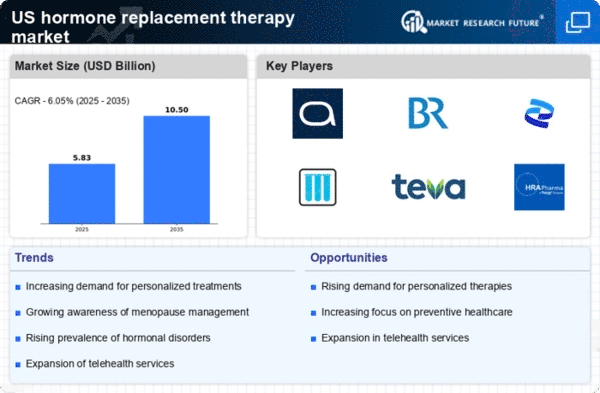Advancements in Medical Technology
Technological advancements in the medical field are significantly impacting the hormone replacement-therapy market. Innovations in delivery systems, such as transdermal patches and implantable devices, are enhancing the efficacy and convenience of hormone therapies. These advancements allow for more precise dosing and improved patient compliance. Furthermore, the integration of telemedicine is facilitating easier access to hormone replacement therapies, particularly for those in remote areas. The hormone replacement-therapy market is likely to see continued growth as these technologies become more widely adopted, making treatment more accessible and effective for patients.
Growing Awareness of Hormonal Health
There is a notable increase in awareness regarding hormonal health among the US population, which is positively influencing the hormone replacement-therapy market. Educational campaigns and advocacy groups are emphasizing the importance of hormonal balance for overall well-being. This heightened awareness is leading to more individuals seeking medical advice and treatment options for hormonal issues. According to recent surveys, nearly 60% of women aged 40 and above express concerns about hormonal changes and their effects on quality of life. As a result, the hormone replacement-therapy market is experiencing a surge in demand for tailored treatment options that address specific hormonal needs.
Aging Population and Increased Demand
The aging population in the US is a primary driver for the hormone replacement-therapy market. As individuals age, they often experience hormonal imbalances that can lead to various health issues. This demographic shift is significant, with projections indicating that by 2030, approximately 20% of the US population will be over 65 years old. Consequently, the demand for hormone replacement therapies is expected to rise, as older adults seek solutions to manage symptoms associated with menopause, andropause, and other age-related hormonal changes. The hormone replacement-therapy market is likely to benefit from this trend, as healthcare providers increasingly recognize the importance of addressing hormonal health in aging patients.
Increased Focus on Preventive Healthcare
The shift towards preventive healthcare is driving growth in the hormone replacement-therapy market. Healthcare providers are increasingly recognizing the role of hormonal balance in preventing chronic diseases and improving quality of life. This proactive approach encourages individuals to seek hormone replacement therapies not only for symptomatic relief but also as a preventive measure against conditions such as osteoporosis and cardiovascular diseases. The hormone replacement-therapy market is poised to expand as more healthcare systems incorporate hormonal health into their preventive care strategies, leading to increased patient engagement and treatment uptake.
Regulatory Support for Hormone Therapies
Regulatory bodies in the US are providing support for the development and approval of hormone replacement therapies, which is positively influencing the hormone replacement-therapy market. Recent initiatives aimed at streamlining the approval process for new therapies are encouraging pharmaceutical companies to invest in research and development. This regulatory environment fosters innovation and increases the availability of diverse treatment options for patients. As a result, the hormone replacement-therapy market is likely to experience growth, with a wider array of therapies becoming accessible to meet the evolving needs of patients.
















